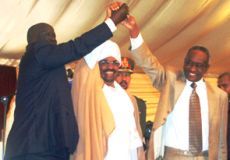Where does Garang’s death leave Sudan’s peace process?
ADDIS ABABA, Ethiopia, Aug 2, 2005 (PANA) — Who in the Sudan People’s
Liberation Movement/Army (SPLM/A) leadership has the credibility,
stature and unifying appeal to step into the shoes of legendary
guerrilla leader John Garang De Mabior?

|
|
Sudanese President Omer al Bashir (center) holds hands with John Garang (right) and Ali Osman Taha (left) in Khartoum, Sudan, Saturday, July 9, 2005. (AFP) . |
This is the question that startles many as the SPLM/A ranks mourn
the passing of their top commander.
Just three weeks ago the prospects for a durable peace in Sudan
seemed very auspicious when Garang was sworn in as the country’s
First Vice President in the government of national unity.
He also assumed the new office of President of the Government of
Southern Sudan as provided for in the country’s 2005
Comprehensive Peace Agreement (CPA).
But, Garang’s untimely death in a helicopter crash on Saturday
night (30 July 2005) has cast a pall of gloom on the Sudanese
peace process, according to observers of political developments
in the country.
Garang met his death as he flew back to Southern Sudan from a
meeting with Uganda’s President Yoweri Museveni.
“His passing has cast a dark shadow over the future of the peace
agreement,” said Njunga Mulikita, a governance expert who until
recently was based in Southern Sudan with the UN Development
Programme.
Describing the aftermath of Garang’s crash as puzzling, Mulikita
told PANA that the critical question is: who in the SPLM/A
leadership had the acceptable attributes to take over Garang’s
mantle?
In his opinion, charismatic leaders like Garang himself, Castro,
Nyerere, Kaunda, Tito etc do not appeal to the rational thinking
of their followers.
“The defining characteristic of charismatic leadership is its
capacity to electrify the emotions of ordinary people.
“Charismatic leaders enjoy the electrifying loyalty of their
followers. John Garang enjoyed such electrifying loyalty from his
followers,” said Mulikita.
Recalling his arrival in Rumbek, the provisional capital of the
fledgling Government of Southern Sudan to address a rally after
the signing of the CPA earlier this year, Mulikita said Garang
drew an audience of over 50,000 at Freedom Square.
“For me, the electrifying reception he received in Rumbek was
reminiscent of the warm reception accorded to Nelson Mandela in
February 1990 when he visited Lusaka, Zambia, the then political
headquarters of the African National Congress (ANC).”
According to Mulikita, a major challenge for the SPLM is to “pick
a successor who will fill in the dangerous vacuum in the
Government of National Unity in Khartoum.”
It remains to be seen whether or not the internal structures of
the SPLM can produce a successor with the appeal to sustain the
unity of the three major regions of Southern Sudan — Bahr-el
Gazal, Equatoria and Upper Nile — which is critical to
implementation of the CPA.
“This issue of ensuring a smooth succession could not take place
at a more problematic time.
“The SPLA is currently undergoing the painful process of
institutionally transforming itself from a guerrilla army into a
political movement,” Mulikita observed.
Also, the succession would be taking place at a time when the
demobilisation and integration of SPLA fighters has fallen behind
schedule, owing to unavoidable administrative and logistical
constraints.
Given the immense loyalty that Garang enjoyed among SPLA
combatants, Mulikita said it remained to be seen whether or not
the fighters would remain calm in the light of their leader’s
death.
During consultations with SPLM officials in Rumbek, one issue
that was recurrently mentioned was that SPLA fighters were
growing restive in view of the slow availability of concrete
material benefits for fighters.
A lot of them suffered horrendous wounds during the two-decade
civil war against the Khartoum government.
Only Garang’s father-like personality, buttressed by the unique
legitimacy and unrivalled moral authority, was able to pacify the
fighters and keep them focused on the peace agreement.
President Omer El Bashir, whose partnership with Garang
culminated in the historic peace agreement, has lost a credible
ally upon whom successful fulfilment of the entire peace
agreement hinged.
Mulikita’s worry was that if a credible successor did not emerge
to inherit Garang’s mantle and Southern Sudan splinters into
ethnic-based factions, the peace process may founder.
“That could strengthen the hand of hard-line forces in the North
who were opposed to the concessions El Bashir made to SPLM during
the peace negotiations,” he added.
Implementation of the peace agreement in light of Garang’s demise
will be no easy task.
The people of Sudan need all the luck in the world to pull it
off.
